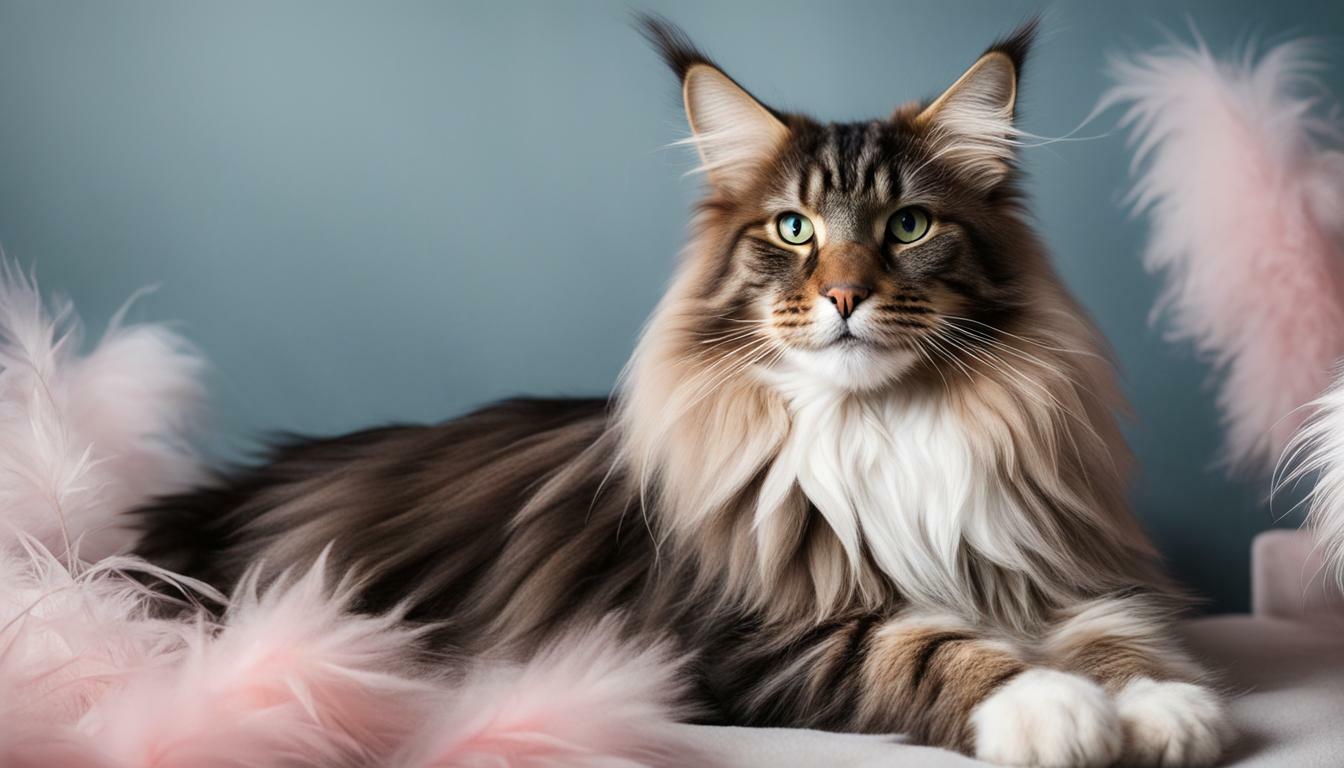Are Maine Coon cats truly hypoallergenic? Let’s uncover the truth behind this popular belief.
Many people believe that Maine Coon cats are hypoallergenic, meaning they are less likely to cause allergic reactions in individuals with cat allergies. However, this belief is not entirely accurate. While Maine Coons may have certain characteristics that can make them more suitable for individuals with mild allergies, they are not hypoallergenic in the true sense of the word.
The main reason why Maine Coon cats are not hypoallergenic is because they produce a protein called Fel d 1, which can trigger allergic reactions in some people. This allergen is present in various parts of the cat’s body, including their saliva, urine, skin, fur, tears, and mucous. Regardless of breed or coat length, all cats produce allergens, and Maine Coons are no exception.
However, there are some characteristics of Maine Coons that may make them more suitable for individuals with mild allergies. For example, Maine Coons tend to shed their fur in clumps rather than spreading it everywhere, which may help reduce allergen exposure. Additionally, regular grooming and bathing of the cat, minimizing contact with allergens, and keeping the home clean can be effective strategies for managing allergies.
It’s important to note that individuals with severe cat allergies should not live with a Maine Coon or any other cat breed. The allergens produced by cats can be highly problematic and may cause severe allergic reactions. Consulting with a healthcare professional is crucial for individuals with severe allergies to determine appropriate solutions and potential medical options, such as antihistamines or other allergy medications, to alleviate symptoms.
Key Takeaways:
- Maine Coon cats are not hypoallergenic, as they produce the allergenic protein Fel d 1.
- All cats, regardless of breed or coat length, produce allergens.
- Maine Coons may shed fur clumps, which can help reduce allergen exposure.
- Mild allergy sufferers can manage their allergies with regular grooming and bathing of the cat, minimizing contact with allergens, and keeping the home clean.
- Individuals with severe cat allergies should avoid living with Maine Coons or any other cat breed.
- Consulting with a healthcare professional is important for individuals with severe allergies to determine appropriate solutions and potential medical options.
Understanding Allergens in Maine Coon Cats
To understand why Maine Coon cats are not hypoallergenic, we need to explore the allergens they produce. Allergens are substances that trigger allergic reactions in sensitive individuals. In the case of Maine Coons, the main allergen of concern is a protein called Fel d 1. This protein is found in various parts of the cat’s body, including their saliva, urine, skin, fur, tears, and mucous.
The presence of Fel d 1 allergen in Maine Coon cats, as well as in other cat breeds, makes them a potential trigger for individuals with cat allergies. It’s important to note that all cats, regardless of breed or coat length, produce allergens. However, some people may be more sensitive to specific allergens, and their reactions can vary in severity.
Interestingly, Maine Coons have a unique characteristic that may help reduce allergen exposure. Unlike many other cat breeds, Maine Coons tend to shed their fur in clumps rather than spreading it all over the place. While this might make their shedding more noticeable, it can also minimize the dispersion of allergens throughout the environment. This shedding pattern could potentially be beneficial for individuals with mild cat allergies who still wish to have a Maine Coon as a pet.
To manage allergies related to Maine Coon cats, there are several precautions that can be taken. Regular grooming of the cat can help reduce the amount of loose fur and dander in the environment. Bathing the cat, if they tolerate it, can further decrease allergen levels on their fur. Minimizing contact with allergens, such as keeping the cat out of the bedroom or using allergen-resistant bedding, can also help. Additionally, maintaining a clean home by regularly vacuuming, dusting, and washing surfaces can reduce allergen buildup.
| Managing Allergies with Maine Coon Cats | |
|---|---|
| Regular Grooming | – Helps reduce loose fur and dander |
| Bathing the Cat | – Decreases allergen levels on the fur |
| Minimizing Contact | – Keep the cat out of the bedroom |
| – Use allergen-resistant bedding | |
| Maintaining a Clean Home | – Regular vacuuming, dusting, and washing surfaces |
For individuals with more severe cat allergies, it may be best to avoid living with a Maine Coon or any other cat. In such cases, consulting with a healthcare professional is essential to explore appropriate solutions. They may recommend allergy medications, such as antihistamines, or other forms of treatment to manage the symptoms caused by exposure to cat allergens.
Managing Allergies with Maine Coon Cats
If you’re determined to have a Maine Coon despite allergies, here’s how you can effectively manage your symptoms. While Maine Coons are not hypoallergenic, there are steps you can take to minimize exposure to allergens and create a more comfortable living environment for both you and your feline companion.
Regular grooming is key in reducing allergens. Brushing your Maine Coon’s coat regularly helps to remove loose fur and dander, which can be a major source of allergens. Consider investing in a high-quality grooming tool designed for cats with long hair to keep their coat well-maintained.
| Tips for managing allergies with Maine Coon cats: |
|---|
| 1. Bathe your Maine Coon regularly: |
| 2. Keep your home clean: |
| 3. Create designated cat-free zones: |
| 4. Use allergen-blocking products: |
| 5. Consider allergy shots: |
Another important aspect of managing allergies with Maine Coon cats is to keep your home clean. Regularly vacuuming carpets, furniture, and curtains can help remove allergens that may have settled. Using air purifiers with HEPA filters can also aid in reducing airborne allergens, providing you with cleaner and fresher indoor air.
To further minimize allergen exposure, it’s recommended to establish designated cat-free zones in your home. This can be particularly useful for individuals who have more severe allergies. Bedrooms, for example, can be off-limits to your Maine Coon, ensuring a safe haven for a good night’s sleep.
If these preventive measures aren’t enough to manage your allergies, you may consider using allergen-blocking products that are specifically designed for cat allergies. These products, such as sprays or wipes, can help neutralize allergens on your cat’s fur and reduce the risk of exposure.
For individuals with more severe allergies, allergy shots, also known as allergen immunotherapy, may be an option to explore. These shots work by gradually exposing your body to small amounts of the allergen and can help build up your immune system’s tolerance over time.
Precautions and Care for Allergy Sufferers
Taking necessary precautions and providing proper care can make living with a Maine Coon more manageable for allergy sufferers. While Maine Coons are not hypoallergenic, there are steps you can take to minimize allergen exposure and create a more comfortable environment for both you and your furry friend.
Grooming and Bathing
Regular grooming is essential to reduce allergens in your home. Brush your Maine Coon regularly to remove loose fur and dander, which can trigger allergic reactions. Consider using a grooming tool specifically designed to capture and minimize shedding. It’s also a good idea to bathe your cat occasionally to further reduce the presence of allergens on their fur.
Minimizing Contact
To reduce allergen exposure, try to minimize direct contact with your Maine Coon. Avoid allowing them on your bed or other furniture where you spend a lot of time. Designate specific areas or furniture where your cat is allowed to roam so that you can better control allergen levels in other areas of your home.
Cleaning and Maintaining an Allergen-Free Environment
Regular cleaning is crucial for allergy sufferers. Vacuum your home frequently using a vacuum cleaner equipped with a HEPA filter to capture allergens effectively. Dust surfaces regularly and consider using allergen-proof covers on your mattresses and pillows. Additionally, investing in an air purifier can help to remove airborne allergens, creating a cleaner and healthier indoor environment.
| Allergy Management Checklist | |
|---|---|
| Groom your Maine Coon regularly to reduce shedding and dander | Check |
| Bathe your cat occasionally to further minimize allergen presence | Check |
| Avoid direct contact with your Maine Coon on furniture or bedding | Check |
| Regularly clean your home, vacuuming with a HEPA filter | Check |
| Dust surfaces and use allergen-proof covers on mattresses and pillows | Check |
| Consider investing in an air purifier to remove airborne allergens | Check |
While these precautions can help manage allergies, it’s important to remember that everyone’s allergies are different. If you have severe cat allergies, living with a Maine Coon may not be feasible. Consulting with a doctor or allergist for personalized advice and recommendations is crucial. They can provide insights into medical options, such as antihistamines, that may help alleviate symptoms and enable you to enjoy the companionship of a Maine Coon without disrupting your quality of life.
Medical Options for Cat Allergies
In addition to lifestyle changes, there are medical options that can help alleviate the symptoms of cat allergies for Maine Coon owners. While it is important to consult with a healthcare professional for personalized advice and recommendations, there are a few common medical options that individuals with cat allergies may consider.
- Antihistamines: Antihistamines are commonly used to relieve allergy symptoms, such as sneezing, itching, and runny nose. These medications work by blocking the effects of histamine, a substance released by the body during an allergic reaction. Over-the-counter antihistamines like loratadine or cetirizine may provide temporary relief, but it’s important to follow the recommended dosage and consult with a doctor if symptoms persist or worsen.
- Nasal sprays: Nasal sprays can help reduce nasal congestion and inflammation caused by cat allergies. Corticosteroid nasal sprays, such as fluticasone or mometasone, are commonly prescribed by healthcare professionals to relieve allergy symptoms. It’s important to use nasal sprays as directed and consult with a doctor for proper dosage and usage.
- Allergy shots: Allergy shots, also known as allergen immunotherapy, may be recommended for individuals with severe cat allergies. These shots contain tiny amounts of cat allergens and are administered over a period of time to help the body build up immunity and tolerance to the allergens. Allergy shots can be effective in reducing or even eliminating allergic reactions in some individuals, but they require regular visits to a healthcare provider and a long-term commitment.
It’s important to note that the effectiveness of these medical options may vary depending on the individual and the severity of their cat allergies. Some individuals may find significant relief with medication, while others may need to explore additional strategies, such as minimizing exposure to allergens or considering alternative pet options. It’s always best to consult with a healthcare professional to determine the most suitable course of action.
| Medical Option | Description |
|---|---|
| Antihistamines | Block the effects of histamine to relieve allergy symptoms |
| Nasal sprays | Reduce nasal congestion and inflammation caused by cat allergies |
| Allergy shots | Administered over time to build up immunity and tolerance to cat allergens |
Conclusion
While Maine Coon cats are not hypoallergenic, there are ways to manage allergies and enjoy the companionship of these magnificent felines. It’s important to understand that all cats, regardless of breed or coat length, produce allergens. Maine Coon cats, like many other breeds, produce a specific protein called Fel d 1, which can trigger allergic reactions in susceptible individuals.
Despite not being hypoallergenic, Maine Coon cats may be more suitable for mild allergy sufferers due to their unique shedding pattern. Unlike some other breeds, Maine Coons shed their fur in clumps rather than spreading it everywhere. This may help to minimize allergen exposure in the environment.
To effectively manage allergies and live harmoniously with a Maine Coon cat, there are several precautions and care routines that can be followed. Regular grooming of the cat can help to remove loose fur and reduce allergen levels. Bathing the cat can also help to remove allergens from its skin and fur. It’s important to minimize direct contact with allergens, such as avoiding face-to-face interaction or keeping the cat out of the bedroom. Keeping the home clean and free from allergens through regular vacuuming, dusting, and maintaining good indoor air quality can also make a significant difference.
For individuals with more severe cat allergies, medical options such as antihistamines or other allergy medications may be necessary. It’s crucial to consult with a healthcare professional for personalized advice and recommendations based on individual circumstances.
FAQ
Q: Are Maine Coon cats hypoallergenic?
A: No, Maine Coon cats are not hypoallergenic. They produce a protein called Fel d 1, which can cause allergic reactions in sensitive individuals.
Q: What is Fel d 1 and where is it found?
A: Fel d 1 is an allergenic protein found in the saliva, urine, skin, fur, tears, and mucous of Maine Coon cats, as well as other cat breeds.
Q: Can individuals with mild allergies live with a Maine Coon?
A: It is possible for individuals with mild allergies to manage their allergies and live with a Maine Coon. Regular grooming, bathing the cat, minimizing contact with allergens, and keeping the home clean can help reduce allergen exposure.
Q: What precautions can allergy sufferers take?
A: Allergy sufferers can take precautions such as grooming the cat regularly, bathing the cat, minimizing contact with allergens, and keeping the home clean to manage their allergies. It is also important to consult with a healthcare professional for personalized advice.
Q: Are there any medical options for cat allergies?
A: Yes, individuals with cat allergies may consider using antihistamines or other allergy medications to manage their symptoms. However, it is important to consult with a healthcare professional for appropriate solutions.



